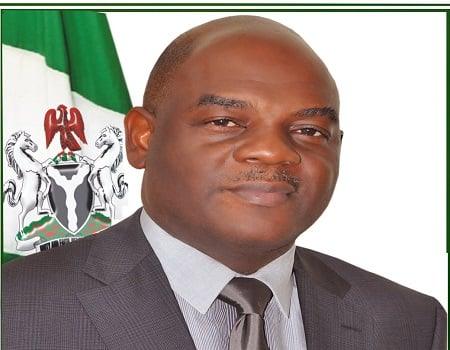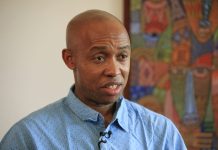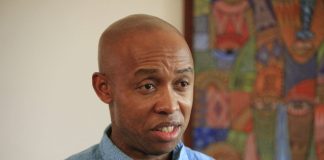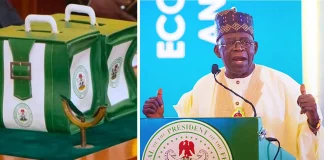🌿 Ruzu Non-Alcoholic Herbal Bitters
Ruzu Non-Alcoholic Herbal Bitters is a natural health supplement specially formulated to:
- ✅ Promote general wellness
- ✅ Detoxify the body
- ✅ Support the treatment of various ailments
Made from a powerful blend of 100% organic and medicinal herbs, Ruzu is completely alcohol-free, making it ideal for:
- 👪 All age groups
- 🌱 Health-conscious individuals
- 🌿 Anyone seeking non-alcoholic herbal remedies
Whether you're looking to boost your vitality, cleanse your system, or support healing the natural way, Ruzu Bitters offers a trusted herbal solution.
If Nigeria were under military rule, Sonny Togo Echono, the Executive Secretary of the Tertiary Education Trust Fund (TETFUND), would have most likely been known as the “action administrator.” Over the course of many years and decades, Nigeria’s governance vocabulary benefited from many modifications and infusions from successive military governments. One such remedy that rose to and remained popular in public discourse in the past was “Action Governor.” It spoke of proactive, possibly overbearing military superintendents who approached public service. Army Colonels Mobolaji Johnson, David Bamigboye, Robert Adebayo, and Osaigbovo Ogbemudia, who oversaw Lagos, Kwara, Western, and Midwestern states, were all named Action Governors for their contributions to the advancement of infrastructure development in their respective states of jurisdiction. Similar decorations were given to Mohammed Buba Marwa, the current chairperson of the National Drug Law Enforcement Agency (NDLEA), a Brigadier-General who oversaw Lagos State from 1996 to 1999.
Marwa was a pioneer in crime prevention, health facility renovation, and road rehabilitation. As part of a crime containment strategy, he formed a joint military and police task force called Operation Sweep, which was successfully adopted by numerous other states. His honorific title of “action administrator” completed all of these. A number of other states followed Marwa’s example, most notably Oyo under Colonel Ahmed Usman and his counterpart from Kogi State, Bzigu Lassa Afakirya, who initiated Operation Gbale (gbale is the Yoruba word for sweeping) and Operation Hot Chase, respectively. Due to his Yoruba-accented pronunciation of the word “action,” Raji Rasaki, a former military administrator of Lagos State, has gained the moniker “akson” governor. He is renowned for the extensive destruction of illegal buildings, which greatly reduced the number of slums and shantytowns in Lagos. This would then affect the state’s real estate market.
Echono has shown that he can speak tough and follow through with similar resoluteness ever since he was appointed to his current position a little more than three years ago. Echono has made an effort to emphasize the fact that a new sheriff is working at TETFUND at every chance. His reform plan started with a series of encounters with the organization’s powerful cabals, who had taken over the authority to decide contract awards. To refresh our memories, Echono was among the first civil servants to be put through the paces of a new due process and public procurement system in the early years of the current democratic age. Throughout his numerous “bus stops” in public service, which included multiple ministries prior to his current schedule, he has “preached the gospel.” Regardless of the establishment’s response, he has never been discouraged.
Read Also: Family Rift: IVD Speaks on Emotional Toll of Separation from Children
He developed unforeseen enemies as a result of his insistence on changes and reorientation. In response, Echono’s “victims” launched a fierce media campaign against him in an attempt to skew the story. The national legislature, which was tasked with overseeing the war, was presented with multiple petitions accusing Echono of massive fiscal violations and corruption. As anticipated, anti-corruption organizations, particularly the Economic and Financial Crimes Commission (EFCC) and the Independent Corrupt Practices and Related Offenses Commission (ICPC), expressed interest in the undesirable information coming from TETFUND. Whenever TETFUND’s systems and his personal profile were subjected to the rigorous serial integrity testing, Echono consistently earned positive test results and clean bills of health, much to the dismay of his translators. Such was Echono’s experience when he took action to halt the bazaar that was already taking place in TETFUND while he was in charge.
Echono has since used the big stick to punish academics who chose to “defraud” the government after taking advantage of the government’s generosity in providing scholarships and grants to study abroad. Some professors and instructors from various institutions have benefited greatly from government support for postsecondary education overseas. Typically, they are expected to return to Nigeria and continue serving their primary employers in order to give back to the system that provided them with this charity. On the other hand, certain professors frequently use bad currency to reimburse the government, who are their benefactors. They “defect,” or go away, as it were. Echono has now said that the government will no longer play Santa Claus in light of the nation’s current economic circumstances, which are influenced by inflation and currency devaluation.
Instead, the government will now assist its scholars and intellectuals in developing their capacity domestically. For example, Nigerian military institutes provide basic and advanced training for military leaders from numerous international nations. There are a few international students in almost every graduating class from the Nigerian Defence Academy (NDA) or Nigerian Defence College (NDC). Why would home-based institutions that have been retooled and recalibrated not also provide advanced training to indigenous scholars? The faculties of numerous colleges and training facilities worldwide are actually populated by Nigerian academics. These include popular travel locations such as South Africa, the United Arab Emirates, Canada, the United Kingdom, and the United States of America. Nigeria might look within so that, within reasonable financial constraints, seasoned Nigerian academics and technocrats at home can influence their colleagues who want advanced exposure and retraining.
In addition, Echono has carried out forensic investigations into the size of postsecondary educational institutions in relation to the funds that are available to them. Echono thinks it’s odd that certain universities have far less students than a pitiful 100 in a place where the population of various citadels hovers around the five figures! Once, an anxious Echono brought up the particular instance of a polytechnic that had just 30 students, had been in operation for four years, and was still receiving government funds. According to him, such an example is incompatible with the government’s goals as expressed through the TETFUND. “Accountability is also paramount in the allocation of funds,” he said. Funds that are found to be unused in the accounts of benefiting organizations will be retrieved and transferred to schools with higher performance ratings. Echono’s frequent criticism of abandoned projects in the country’s public tertiary institutions is equally forceful. Under his supervision, such unsightly stumps in institutional landscapes and monuments to waste will no longer be allowed.
In a more recent warning, Echono cautioned TETFUND-administered institutions about the misuse and abuse of intervention money. At a two-day strategy training for directors of academic planning, physical planning, and information and communications technology that started in Abuja on Monday, July 7, 2025, Echono issued a warning: if resources are misused, defaulting institutions will be delisted. By filling in procedural gaps and making sure that institutions are fully aware of the agency’s intervention rules, he reaffirmed the government’s commitment to supporting the country’s tertiary educational system. The head of TETFUND stated that poor performance and poor management will not be tolerated. Echono restated that “institutions that underperform in key academic or operational benchmarks, or those that fail to access, use, or retire funds in accordance with TETFUND guidelines, may be delisted.”
Echono’s thoughtful interventions have elevated a public service that is typically perceived as dreary, uninspired, and tepid. Regular interactions and linkages with important players in the tertiary education sector have been hallmarks of his administrative style. Up until now, the only frequent attendees at meetings with the leadership of TETFUND were vice chancellors, rectors, and provosts at the top of universities, polytechnics, and colleges of education. However, the Echono milieu has broadened the range of engagements. Under Echono’s direction, TETFUND has also gained the support of other important players in the tertiary institutions’ leadership groups, particularly the heads of the administrative, financial, and developmental departments. The meeting room inside the organization’s Abuja headquarters building is constantly bustling with activity. All of them are intended to improve the nation’s tertiary education system’s performance and provide it with the skilled labor required to propel growth and development.
Future studies will focus on Echono’s transition because he was a dedicated public servant who gained his start in the very center of the bureaucracy, where he excelled for three and a half decades prior to his current portfolio. He began working for the government in 1987 and left in early 2022. He worked in a number of ministries over his years in service, holding a variety of positions and responsibilities. According to the civil service’s rulebook, “civil servants can be seen but their voices are not to be heard.” The similar system gave rise to Echono. However, while continuing to serve the country, his current job description has brought out the more outspoken, outgoing side of him.
*Olusunle, PhD, FANA, is an adjunct professor of creative writing at the University of Abuja and a Fellow of the Association of Nigerian Authors (FANA).
















